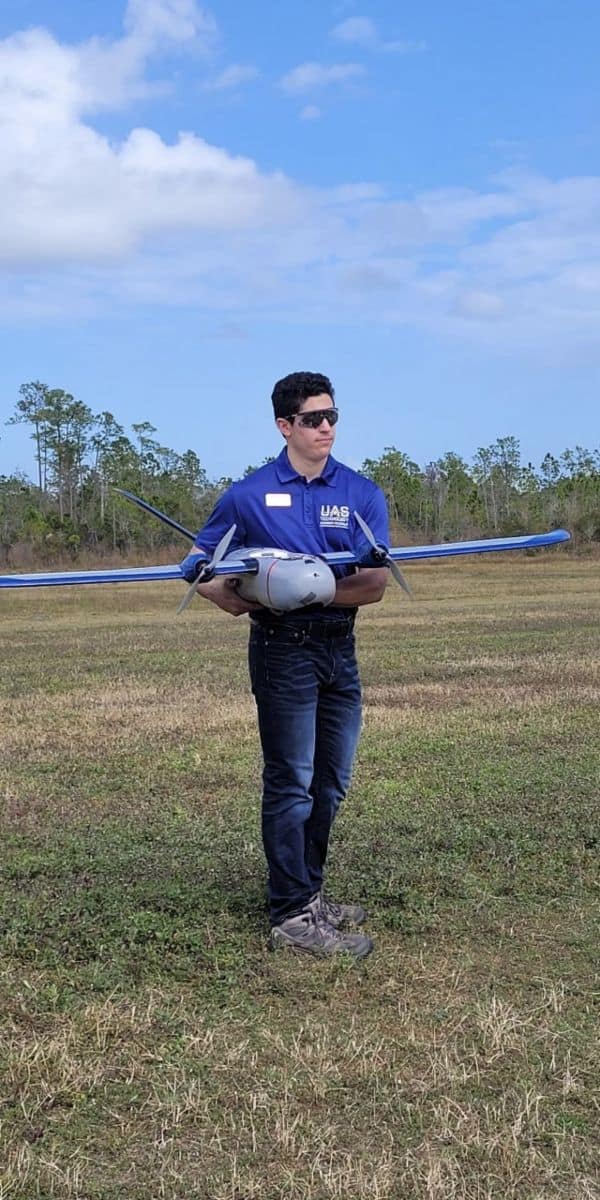

Uncrewed Aircraft Systems: Opportunity is in the Air

Embry‑Riddle Aeronautical University's Uncrewed Aircraft Systems (UAS) bachelor’s degree program, the first accredited UAS program in the country, offers unique and exciting opportunities in a rapidly growing and evolving field. Students learn from professors who are industry pioneers, top in their field and who understand the direction the industry is headed.
“A lot of people have said we’re at the Wright Brothers’ age of UAS,” said UAS major John Christensen (‘24). “When you think of flying practically, there are barriers that man can’t really pass when it comes to flight. That’s not the same for autonomous flying or uncrewed flying. There’s going to be a lot of discoveries, a lot of new doors that are going to be opened on the UAS front and I want to be a part of that.”

UAS major Michael D'Alonzo ('23) has used drones to investigate the damaging impact Hurricane Ian has had on the local community of Daytona Beach, Florida. (Photo: Micahel D'Alonzo)
Students can get involved in important research using UAS technology and Michael D’Alonzo (‘23) appreciates how the program is focused on “giving students opportunities out of the classroom.” He took part in a project surveying and assessing storm damage to a Daytona Beach church after Hurricane Ian ripped through Florida.
The project consisted of flying uncrewed autonomous vehicles (UAVs) over the structure, taking pictures of different sections at various angles. D’Alonzo then created a presentation using the photos to help brief church leaders.
Christensen is a pilot for the Turtle Tech project, which uses drones to track the nesting habits of endangered sea turtles. Not only has he gained valuable experience, but he has made important connections with industry giants who attend launch events, such as Raytheon, Northrop Grumman and Censys—the latter of which made the Sentaero uncrewed aerial vehicle (UAV) used in the project.
UAS Tech Club
Christensen enhances his UAS experience as president of the UAS Tech Club where he plans missions for its members, which includes everything from surveying to mapping. He also educates members on how UAS can be integrated in business.
“There’s a whole business side where it’s being applied, and it’s attracting more people to the UAS degree and showing the opportunities that will be opening up in the next few years in the field,” he stated.
As a past president of the UAS Tech Club, D’Alonzo was described as a “super student leader” by Dr. Dan Macchiarella, aeronautical science professor, who “enabled students to get valuable UAS experience with the club while working with students from a variety of degree programs.”
Creating Unique UAS Opportunities
The program has created unique opportunities for students, such as a trip to Arizona and New Mexico in summer 2022 to work with archaeologists mapping out ancient cities. In summer 2023, the program will take Christensen to Argentina, where he will earn nine credits flying UAVs at high altitude in the Andes Mountains. He will also have the chance to learn their aviation laws and teach local pilots who want to know how UAS is applied outside of recreational activities.
“I think Riddle has done a really good job of opening a lot of those worldwide opportunities,” he said.
“It’s something that not a lot of colleges offer,” D’Alonzo states about the uniqueness of the UAS program. “This is a really good spot to be.”
Christensen knows he made the right decision choosing Embry‑Riddle and appreciates everything the UAS program has afforded him. He knows he will graduate prepared to make an impact.
When I heard I got into Embry‑Riddle, I just dropped everything,” he said. “I went.” He added, “I love the culture. I love the campus. I just love it here. I love all the connections I’ve made, and I love all the opportunities.

